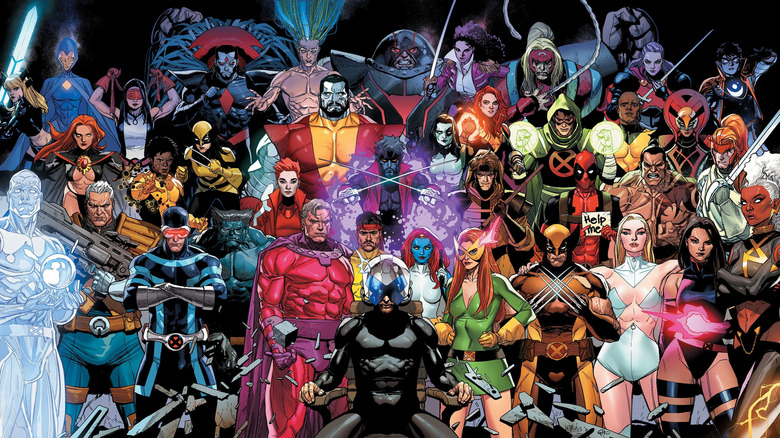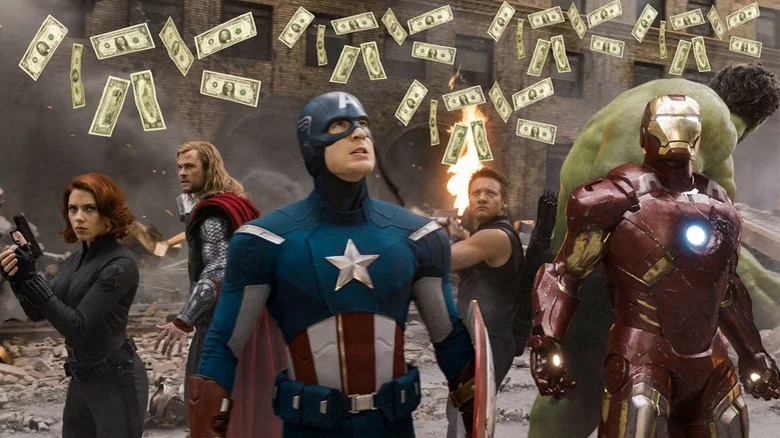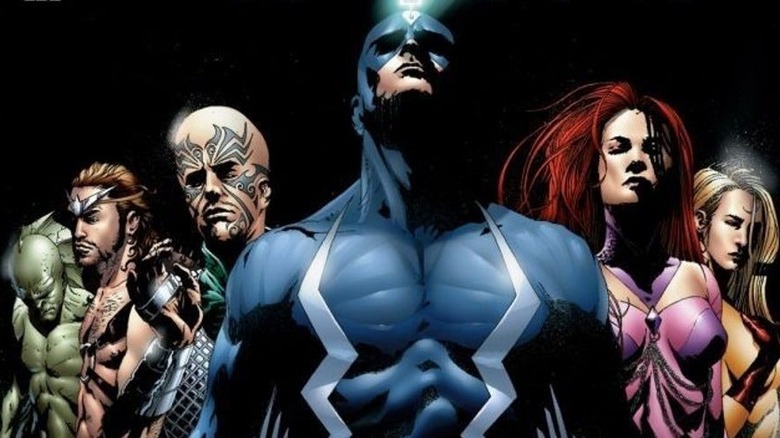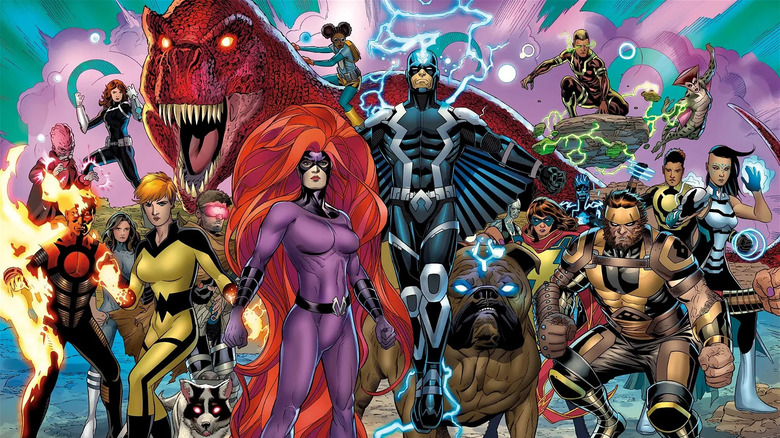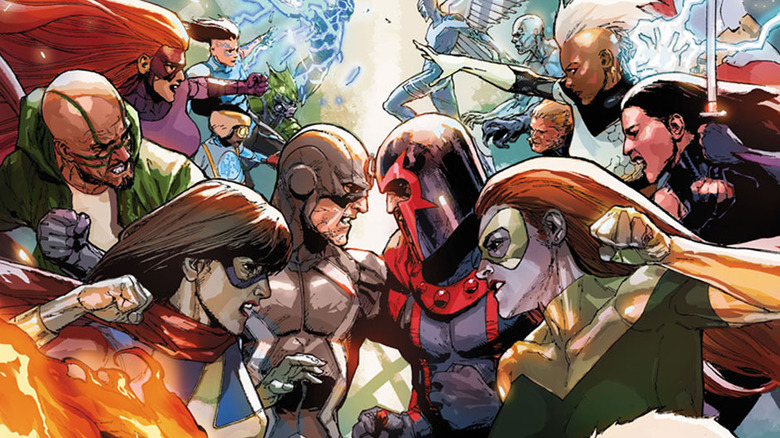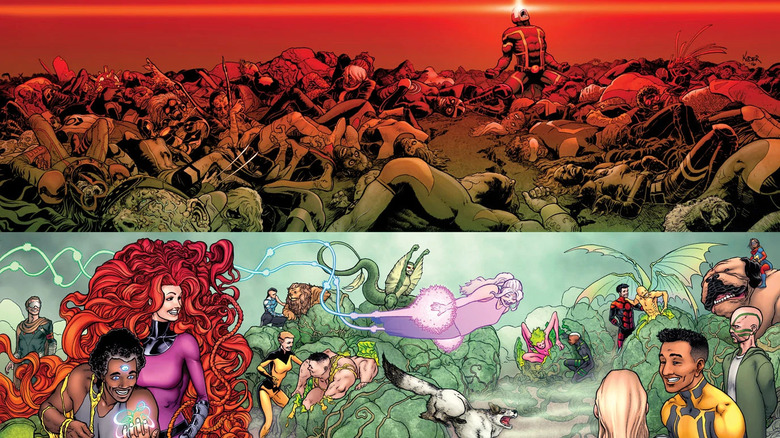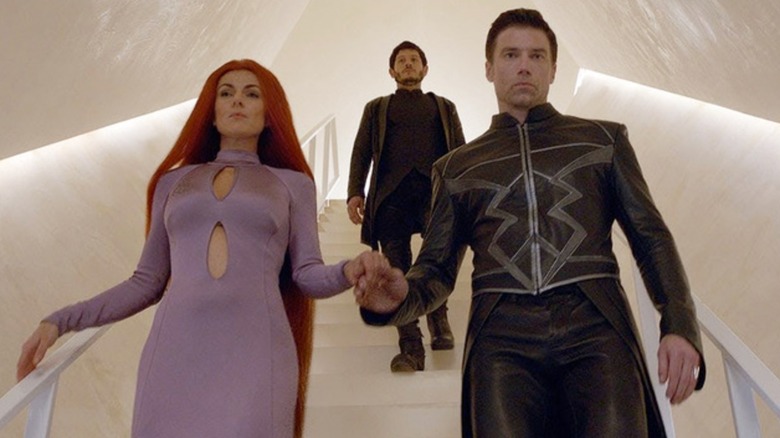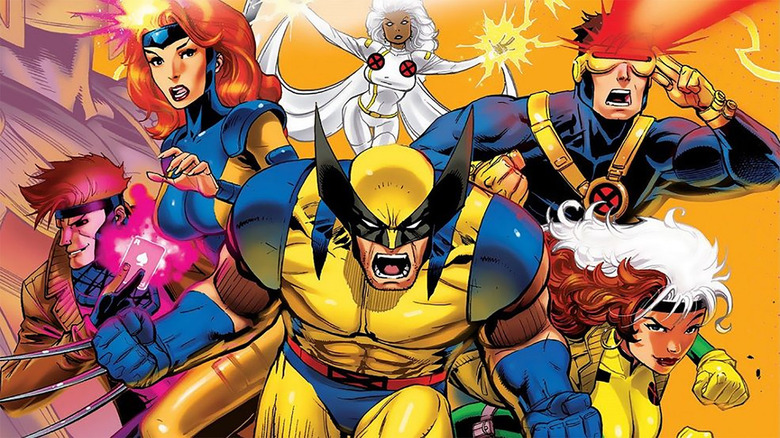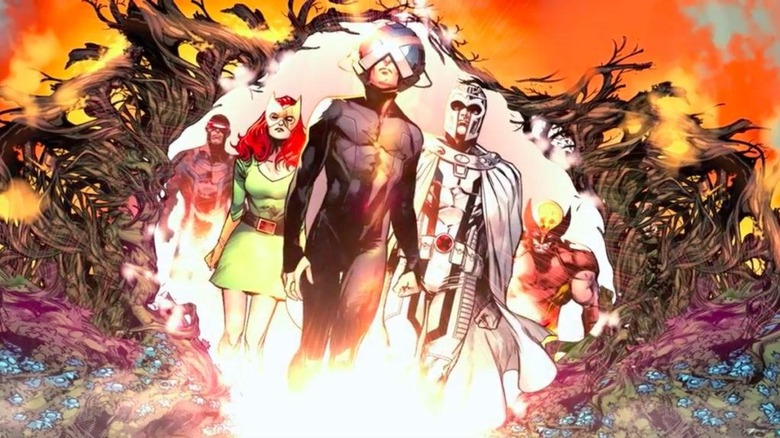The MCU Put A Target On The Back Of The Comic Book X-Men – Here's How They Survived
The Marvel Cinematic Universe changed who the stars of the Marvel comic universe are. Before the 2000s, the Avengers were the B-team while the X-Men sat beside Spider-Man as the company's crown jewel. There's a reason that 20th Century Fox bought the movie rights to X-Men, not the Avengers — a decision that had endless ramifications, especially once Marvel started making their movies in-house and eclipsed the third-party adaptations in public consciousness.
In 2019, Marvel's parent company Disney merged with 20th Century Fox, bringing the X-Men back under their roof. Reports indicate Marvel Studios is about to make a new X-Men movie a priority. This is quite the turnaround from a decade ago when Marvel was working to consign the X-Men to the ash heap of history — so long as they couldn't make any movies about them.
I'll disclose my bias; I'm an "X-Men" fan and I'm still a bit bitter about how they spent the 2010s marginalized. Just because the Merry Mutants have a secure future again doesn't mean all is forgiven or forgotten. The handling of the X-Men shows the current peril of Marvel's superhero comics; the source material has become little more than an IP farm.
Granted, consistent storytelling at Marvel Comics has always taken a backseat to editorial whims and crowd-pleasing (late editor-in-chief Stan Lee was a born salesman). The naked cynicism of MCU synergy is still a new low, though.
X-Men erasure
2012 was the year the Marvel Universe changed forever. "The Avengers" became one of the highest-grossing films ever, the initial team-up proving that the MCU wasn't a failed experiment. That only heightened the competition between Marvel Studios and both 20th Century Fox and Sony (owners of Spider-Man's movie rights). After "The Amazing Spider-Man 2" underperformed, Sony came to the bargaining table and worked out a deal to include Spidey in the MCU. Fox, owners of not just the X-Men's movie rights but also the Fantastic Four's, was a different story.
Marvel Studios' movies were now the company's creative cornerstone, not the comics. "X-Men" and "Fantastic Four" comics would be just advertisements for their competitors in that sphere. That was reportedly the attitude of Ike Perlmutter, then chairman and CEO of Marvel. BleedingCool reported in 2014, during the lead-up to the now-infamous 2015 "Fantastic Four" film, that Perlmutter enacted a purge of the Fantastic Four, canceling both the comic and licensed FF toys while removing posters featuring the team from the Marvel offices.
The 2015 comic event "Secret Wars" (by Jonathan Hickman and Esad Ribić) removed the Richards family from Marvel Earth-616 (they've since returned), while their nemesis Doctor Doom got absorbed by Marvel's new flagship title, "Iron Man". It didn't end there.
The mutant twins Quicksilver and Scarlet Witch have been associated with both the X-Men and the Avengers, hence both Marvel Studios and Fox had a claim to their film rights. In 2015, they debuted in the MCU (see "Avengers: Age of Ultron") while their comic selves had their X-Men connections severed; they were no longer mutants, as they had been forever, or Magneto's children, as they had been since the 1980s. Such retcons aren't unusual in comics, but these were driven only by marketing. Perlmutter planned to supplant the X-Men with another batch of superpowered outsiders: the Inhumans.
The Inhumans
Created by Jack Kirby and Stan Lee, the Inhumans debuted in "The Fantastic Four" #45 (their queen Medusa had appeared previously as a brainwashed villainess). The cover boldly declares, "Among us hide ... the Inhumans!"
The Inhumans are descendants of humans experimented on by the alien Kree during Earth's prehistory. When exposed to "Terrigen Mists" at puberty, they enter a chrysalis and emerge with superpowers. They live isolated from other civilizations in their city Attilan (which has been located everywhere from the Himalayas to the Moon). Inhuman society is a rigid caste system, with the leads being members of the royal family: Black Bolt, Medusa, Karnak, Gorgon, Triton, and Crystal. Their introductory arc in "Fantastic Four" was about them being deposed by Black Bolt's evil brother Maximus and then restored.
The X-Men comic didn't quite catch on in the 1960s, but since it relaunched in the 1970s, it's been a hit. The Inhumans, though, have always remained ancillary. They had an acclaimed 1998 comic mini-series by Paul Jenkins and Jae Lee, and guest starred in the 1990s "Fantastic Four" cartoon in an adaptation of their comic debut. Always heroes, never the heroes.
For Perlmutter, though, the mutants and Inhumans were conceptually similar enough as two races of superpowered outsiders. So began the push to build an "Inhuman" franchise, which meant introducing a lot of new characters with stories to adapt for film.
Nuhumans
The Inhumans appear in "Infinity" (a crossover event anchored in Jonathan Hickman's "Avengers" run). During this story, a bomb containing Terrigen Mists is dropped on Earth, causing plenty of latent Inhumans to undergo "Terrigenesis." This thread was picked up in the ongoing comic "Inhuman" (primarily written by Charles Soule and drawn by Ryan Stegman), focusing on these newly awakened Inhumans.
The thing is, the "Nuhumans" are practically indistinguishable from Mutants; ordinary people discover they have superpowers and are ostracized by the society they live in for it. "Inhumans" is a more out-there and otherworldly comic than "X-Men"; their stories are more about palace intrigue than fighting all-too-human prejudice. The Inhumans characters can be considered ancestors of Kirby's "New Gods" series at DC, sharing the same colorful designs, a fantasy kingdom setting, etc. Veteran comic writer Gerry Conway neatly summed up the difference:
The difference between the X-Men's focus (and Legion, and The Gifted) and the Inhumans' is the difference between oppressed and oppressor.
— Gerry Conway Stands With Ukraine (@gerryconway) October 2, 2017
Taking the Inhumans in this new direction created a redundancy — one no readers had asked for. After "Secret Wars," every Marvel comic was relaunched under the brand banner, "All-New, All-Different Marvel." Take note of these character line-up posters and you'll easily spot the MCU influence. Iron Man is front and center on both. Previous C-listers like the Guardians of the Galaxy and yes, the Inhumans, get top billing. The only trace of the X-Men is the two Wolverines. 10 years prior, this arrangement would've been unthinkable. The comics that followed continued this storm.
Inhumans vs X-Men
The X-Men weren't exactly erased in "All-New, All-Different Marvel" the same way the Fantastic Four were. They had four ongoing titles: "Extraordinary X-Men" (by Jeff Lemire and Humberto Ramos), "Uncanny X-Men" (by Cullen Bunn, carrying on from his earlier "Magneto" series, and Greg Land), "All-New X-Men" (by Dennis Hopeless and Mark Bagley), and "X-Men '92" (a comic done in the style of the beloved "X-Men" cartoon). There were also two Wolverine books, "All-New Wolverine" (by Tom Taylor and David Lopez) and "Old Man Logan" (by Lemire and Andrea Sorrentino).
However, the push for "Inhumans" was still there and even more visible. They now had three ongoing titles: "All-New Inhumans" (by Soule, James Asmus, and Stefano Caselli), "Uncanny Inhumans" (by Soule and Steve McNiven), and "Karnak" (by Warren Ellis and Gerardo Zaffino). In this case, supply was caused by only Ike Perlmutter's demand. The two franchises sharing the "Uncanny" adjective, thereby equating them, rubbed salt in X-fans wounds.
It got worse; it was revealed in "Extraordinary X-Men" that Terrigen Mists are lethal to mutants (the resulting disease became called M-Pox) and its presence in the atmosphere will eventually wipe them out. The metaphor is obvious; the Inhumans' presence is killing the X-Men. The title of the prequel mini-series that reveals how the feud broke out? "Death of X." However, for readers, this only underlined what they disliked about these developments; the declining sales figures for "Inhuman" comics show that.
"Extraordinary X-Men" and "Uncanny X-Men" starred Storm and Magneto, respectively, leading X-Men teams with the goal of securing mutant-kind's future; conflict with the Inhumans would eventually boil over, and it did in the panned event "Inhumans vs X-Men."
I should say that Jeff Lemire and Charles Soule are both talented writers. While they were the head writers of this X-Men/Inhumans era, I can't lay the blame all at their feet.
Writers speak out
If you followed Marvel comics in real-time from 2015 to 2017, it was plain as day what was happening. However, several Marvel writers have also spoken out about their experience behind the scenes.
Let's return to Jonathan Hickman, who wrote "Fantastic Four" from 2009 to 2012 and then the team's temporary departure in "Secret Wars." He told Newsarama in 2017 that it was "common knowledge" that the Fantastic Four had been canned not due to a "disconnect" with readers, but because of "[Marvel's] disagreement with Fox."
Rick Remender, who wrote X-Men adjacent series like "Uncanny X-Force" and "Uncanny Avengers," revealed in 2020 that he'd pitched himself as the writer of the main "X-Men" title back in 2014, with a whole production bible mapping out two years worth of story. Remender's pitch went unrealized because "[He] couldn't make [himself] do the mandated Inhumans story."
Chris Claremont, who made the X-Men into Marvel's flagship characters during his 1975 to 1991 run writing them, was quite open too. During Claremont's 2014 appearance on the Nerdist podcast (when he was writing the comic "Nightcrawler"), he revealed Marvel writers were not permitted to create new mutant or X-Men characters; doing so would basically be handing IP to Fox free of charge. At New York Comic-Con in 2016, Claremont argued:
"That has nothing to do with comic sales, that has everything to do with the fact that the film rights are controlled by a rival corporation [...] If the X-Men film rights were owned by Marvel Studios and not Fox, the X-Men would probably still be the paramount book in the canon."
On the other side of the table, Soule admitted to ComicsXF in 2021 that he had to remember to tune out fan backlash when writing "Inhumans."
The Inhumans falter onscreen
Inhumans being force-fed to Marvel comic readers was obviously just a prelude to their planned introduction in the MCU. In October 2014, an "Inhumans" movie was announced as part of the franchise's "Phase 3," alongside "Black Panther," "Captain Marvel," and the capstone "Avengers" films. "Inhumans" was meant to be released on November 2, 2018, between "Captain Marvel" and the film that became "Avengers: Endgame."
Compared to Marvel Studios' usual factory-esque pump-out, "Inhumans" stalled. Joe Robert Cole was announced as the writer, but he confirmed to /Film in 2016 that he wasn't writing the film, nor had anyone else. "Inhumans" wasn't officially canceled, but it was pulled from Marvel's release schedule in 2016.
The Inhumans were moved to TV, where Perlmutter had more direct control (compared to Marvel Studios, run by Kevin Feige). ABC series "Agents of S.H.I.E.L.D." featured Inhumans in the Nuhumans mold, while an eponymous series starring the Inhuman Royal Family was scheduled for 2017.
The resulting show was widely panned. On November 2, 2018 (when the "Inhumans" movie was supposed to be released), Graeme McMillan of the Hollywood Reporter wrote that Marvel Studios made the right call shelving the movie, highlighting how the attempts to make "Inhumans" a blockbuster franchise had failed even on the comic publishing front. In the wake of ABC's "Inhumans," Brett White of Decider compared it with "The Gifted" (an FX series based on "X-Men"). The piece's headline, "How 'Inhumans' And 'The Gifted' Prove The X-Men Can Never Be Replaced," rang resoundingly true.
ResurrXion
Discussions for the Disney-Fox merger began in 2017, which is also when the X-Men stopped being Marvel's whipping boys. Coincidence? Not in the slightest. The Inhumans not taking off didn't help, but ultimately it was the Disney-Fox merger that brought the X-Men back to prominence. Since their movie rights were with Marvel Studios, there was no financial incentive for Marvel Comics to exclude them.
In 2017, Marvel announced "ResurrXion," the new branding for the "X-Men" and "Inhuman" comics. This banner ultimately included 14 "X-Men" titles and only four (short-lived) "Inhumans" ones; it's clear who was the top dog again.
The Disney/Fox merger went through in 2019, by which time those characters also returned to prominence in the pages of Marvel Comics. The Fantastic Four comic resumed in February of that year, while the X-Men were headed for a renaissance. In 2019, Hickman and artists Pepe Larraz and R.B. Silva put out "House of X/Powers of X," two intertwined, time-bending miniseries that rebuilt the X-Men status quo from the ground up.
In this series, the mutants found their own nation on the living island of Krakoa. Former enemies become allies as all the previous villains, from Apocalypse to Mr. Sinister, are pardoned and accepted as Krakoan citizens. The mutants create their own language, buy diplomatic immunity with life-sustaining drugs, and even defeat death thanks to psychic memory back-ups and cloning.
House of X/Powers of X
The X-Men might still be feared and hated, but they weren't hiding in the shadows anymore; mutant-kind was finally the master of their own destiny. After a half-decade of the X-Men being disrespected, this was all the more refreshing.
In an interview on the Cerebro podcast, Hickman said the goal of his premise was to essentially give both ideological frenemies Professor X and Magneto everything they wanted — and in turn, question if that is a good thing. Spinning out of "House of X/Powers of X" were new "X-Men" comics galore, exploring familiar characters in these new trappings and answering Hickman's question.
As for the Inhumans? In 2018, Marvel published the mini-series "Death of the Inhumans" by Donny Cates and Ariel Olivetti. That title was just as permanent as "Death of X" was, but it still signifies a rapid fall from grace. Kamala Khan/Ms. Marvel, undoubtedly the most popular of the Inhuman characters created in the 2010s, has been retconned as a mutant in both the comics and MCU. The synergy is now tilting the other way.
I've probably sounded vindicative towards the Inhumans as a whole, but the truth is they're just a red herring. The real problem is the political economy of art and how it's been slanted towards conglomerates and recycling the familiar. Did I celebrate the Disney/Fox merger just because it could help the X-Men? Certainly not; it led to the lost jobs that corporate mergers always do and the consequences for cinema and its preservation have been universally bad.
Superheroes are sometimes described as our modern myths. To truly be that, though, their fates must lie in the hands of storytellers, not at the whims of corporate bosses.
